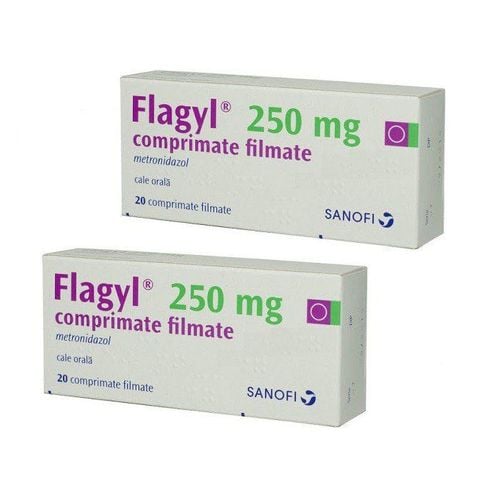Megyna is a gynecological medication used to treat vaginitis caused by Candida albicans, Trichomonas, or various other mixed causes. To ensure effective use, users must follow the doctor's instructions carefully.
1. What is Megyna?
Megyna is a gynecological medication formulated as vaginal tablets with the following ingredients:
• Chloramphenicol 80mg: an antibiotic that has a bacteriostatic effect but can be bactericidal at high concentrations or against highly sensitive bacteria.
• Dexamethasone 0.5mg: an anti-inflammatory and anti-allergic medication.
• Metronidazole 200mg: an antibacterial drug belonging to the nitro-5-imidazole class, with a broad antibacterial spectrum against protozoa such as Giardia and amoebae, as well as anaerobic bacteria. The absorption of metronidazole when used vaginally is only half as effective as when taken orally at the same dosage.
• Nystatin 100,000 IU: an antifungal antibiotic.
2. Indications and Contraindications
2.1 Indications for the use of Megyna
Megyna is indicated for cases of vaginal inflammation due to various causes, such as:
• Bacterial infections
• Infections due to protozoan Trichomonas or Candida albicans
• Vaginitis due to mixed causes
In addition to these uses, Megyna may also be used to treat other conditions not listed above. Therefore, before using the medication, it is advisable to consult a doctor for guidance on effective usage.
2.2 Contraindications for the use of Megyna
Contraindications for the use of Megyna include:
• Hypersensitivity to any ingredient in the medication and imidazole derivatives
• Pregnant and breastfeeding women
3. How to Use and Dosage of Megyna
Megyna is administered as a vaginal insert. The usual dosage is 1 tablet per day, used continuously for 10-15 days. It is recommended to use Megyna regularly to gain the most benefits from it. For safe usage, insert Megyna as directed by your doctor; do not exceed the recommended dose, use less than prescribed, or extend the duration beyond the recommendation. Do not abuse the medication for prolonged periods or increase the dosage on your own.
Note: The dosage mentioned above is for reference only; patients should strictly follow the doctor's instructions for effective and safe use of the medication.
4. Adverse Effects of Using Megyna
Some adverse effects that may occur when using Megyna include:
• Digestive disorders such as loss of appetite, nausea, vomiting, and diarrhea
• Itching
• Hives
• Flushing of the face
• Red-colored urine
High doses or prolonged treatment may lead to leukopenia and peripheral sensory neuropathy, which typically recover upon discontinuation of the medication.
Before prescribing the medication, doctors always weigh the benefits and effectiveness that Megyna provides against the risk of side effects. However, some cases may still experience adverse effects while using Megyna. Therefore, if any unusual signs occur after using the medication, especially severe allergic reactions such as difficulty breathing, severe dizziness, swelling, rash, or itching of the face, throat, or tongue, patients should seek immediate medical attention and inform their doctors for prompt management.
5. Some notes When Using Megyna
Some notes when using Megyna include:
• Inform your doctor about any history of allergies to Megyna or any other allergies. Megyna may contain inactive ingredients that can cause allergic reactions or other serious issues.
• Notify your doctor of all medications you are currently taking, including prescription drugs, over-the-counter medications, herbal remedies, dietary supplements, foods, dyes, or preservatives.
If you forget to insert a tablet, make up for the missed dose as soon as possible. However, if the time you remember is close to the time for your next dose, skip the missed dose and continue using the medication as originally scheduled. Do not double up on doses or take more than the prescribed amount.
6. Drug interactions
Drug interactions may reduce the effectiveness of Megyna or increase the risk of adverse effects. Inform your doctor about all other medications you are taking, including vitamins, over-the-counter drugs, prescription medications, and herbal products. Do not stop, start, or change the dosage of any medication without your doctor’s approval.
Some medications that may interact with Megyna include:
• Phenobarbital: Concurrent use with Megyna may increase the metabolism of metronidazole, leading to faster elimination of the drug. It may also increase the clearance of dexamethasone, thereby reducing its therapeutic effect.
• Coumarin derivatives: These may enhance effectiveness when taken simultaneously with metronidazole and dexamethasone.
• Riboflavin phosphate: This may diminish the antifungal effect against Candida albicans.
7. How to store Megyna
Store Megyna at a temperature below 25 degrees Celsius, away from light and moisture. Do not store Megyna in damp places or in the freezer. Each type of medication has different storage requirements, so be sure to read the storage instructions for Megyna on the packaging or consult a pharmacist. Keep Megyna out of reach of children and pets. Dispose of any expired or unusable medication properly.
In summary, Megyna is a gynecological medication used to treat vaginitis caused by Candida albicans, Trichomonas, or various mixed causes. However, Megyna may cause some adverse effects and drug interactions, so inform your doctor about any medications you are taking to reduce the risk of side effects and enhance the effectiveness of treatment.
Follow the website of Vinmec International General Hospital for more health, nutrition, and beauty information to protect your health and that of your loved ones.
To arrange an appointment, please call HOTLINE or make your reservation directly HERE. You may also download the MyVinmec app to schedule appointments faster and manage your reservations more conveniently.
To arrange an appointment, please call HOTLINE or make your reservation directly HERE. You may also download the MyVinmec app to schedule appointments faster and manage your reservations more conveniently.








